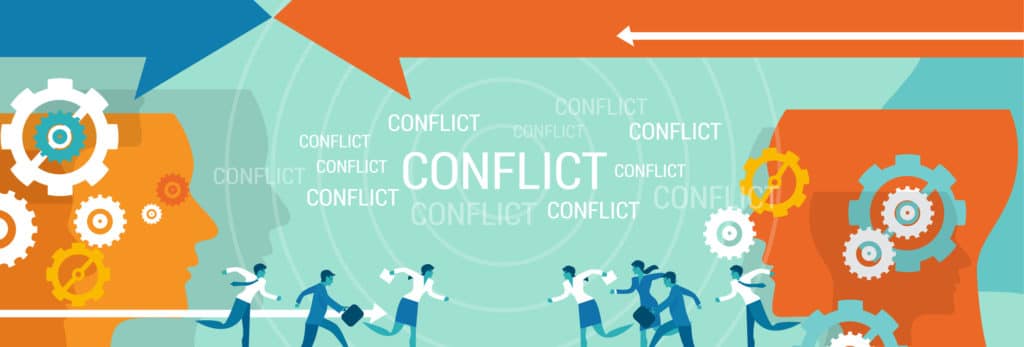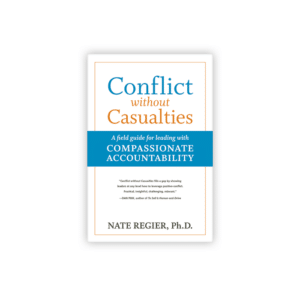
Top 10 Resources for Dealing with Interpersonal Conflict
Share viaAre you drained by miscommunication and drama? Are you ready to improve how you navigate the inevitable conflict communication at work and transform conflict energy into constructive outcomes?
Here are ten resources to get you started: 1) Understand the true purpose of conflict, 2) Distinguish between conflict styles and conflict skills, 3) Recognize drama around you, 4) Replace drama with Compassionate Accountability, 5) Stop the drama, use the conflict, 6) Learn how to initiate difficult conversations with grace and dignity, 7) Learn how personality impacts interpersonal conflict and communication, 8) Master four leadership communication styles, 9) Learn the six love handles of positive communication, and 10) Eliminate three words that will change your life.
The Purpose of Conflict: How To Deal With Conflict Constructively
Conflict originates from differences. Differences are natural. Therefore, conflict is an inevitable consequence of diversity. The purpose of conflict communication, then, is to create something new and better. So how do things go off the rails while engaging in conflict communication? Are you left wondering how to deal with conflict constructively?
Conflict Styles vs. Conflict Skills
If your leaders are trying to learn how to deal with conflict constructively, awareness of their “style” is much less important than learning actual skills and strategies to walk into any conflict situation and use that energy to generate positive outcomes. That’s the key to healthy conflict communication.
Five Signs Your Are Working With a Drama Queen (or King)
I was signing books after a speaking engagement and a woman approached me quite excited about the “no drama” stickers we were giving away. She asked if she could take a handful of stickers, then proudly announced to all who could hear, “I’m going to put this on my office door because I don’t do drama and I don’t tolerate drama.” This comment immediately polarized the crowd into two camps; those who agreed with her and cheered out loud, and those who felt uncomfortable with this woman’s lack of awareness and chuckled under their breath.
Drama alert! This article from Inc.com outlines five signs that you’re working with a drama queen or king.
Replace Drama With Compassionate Accountability®
Drama is the unhealthy manifestation of interpersonal conflict. In this interview with Meredith Bell, I explain the three Drama roles in Karpman’s Drama Triangle, and show how they create mischief and undermine our best laid plans. Then, I demonstrate the antidote, Compassionate Accountability, and show how the three skills of The Compassion Cycle can be used to repurpose that energy into positive outcomes.
How Great Leaders Stop the Drama And Use The Conflict
Many leaders confuse interpersonal conflict with drama. It’s not surprising since conflict is often expressed through drama. It’s also not surprising that many leaders would try to eliminate conflict in order to stop the drama. When the conflict is gone, so are many of the foundational characteristics of strong, healthy work cultures. How a leader deals with the conflict determines whether conflict results in drama, or something different and better.
Initiate Difficult Conversations With These Three Steps
Shortly after George Floyd’s death, I reached out to one friend who leads diversity, equity and inclusion initiatives for a company in Atlanta. Her request was simple but profound; “We just need better ways to talk to each other right now.” She spoke not only to the stress and strain of COVID-19 but also to the heightened tension around race relations and political division.
Since then, our company has had hundreds of conversations with leaders passionately seeking better ways to have those hard conversations. So, how DO we talk about difficult, emotional stuff without it escalating and making things worse? Is your team struggling with how to deal with conflict constructively? In this interview with SmartBrief, I share a simple four-step process powered by Compassionate Accountability. Contrary to what Harvard Law School recommended in this article, I suggest using emotional discomfort as your ally.
How Personality Influences Interpersonal Conflict and Miscommunication
Join my interview with Rikki Schwartz on Transformation Talk Radio to explore the fascinating world of The Process Communication Tool (PCM). Created by Dr. Taibi Kahler, PCM is a tool that identifies our core “personality type” (primarily based on the language we use), which then brilliantly predicts our communication style, psychological/motivational needs, and behavior (particularly under stress). If you want to radically improve the way you communicate with friends, family and/or colleagues, don’t miss this show!
Four Styles of Communication Every Leader Should Master
In my first leadership role, I supervised a very creative and spontaneous clinician who was also deeply committed to his work. I would frequently ask him questions about what he was doing. He often got defensive and interpreted my approach as me not trusting him. This wasn’t my intention at all. Once I learned the The Process Communication Model I realized that neither of us was wrong; we had very different preferred styles of communicating. Read this article to learn the four main interaction styles, and when to use each one to reduce miscommunication.
The Six Love Handles of Communication
How you say something is often more important than what you say. Most miscommunication and interpersonal conflicts occur because people aren’t speaking the same language, but they don’t realize it. This article explores six different currencies of communication that can help you recognize how to reduce unnecessary conflict by changing HOW you are communicating.
Three Words That Will Change Your Life….If You Never Use Them Again
How we say something can have a profound impact, positive or negative? Some words are more powerful than others. They mean more than just their definition. They convey deeper intentions that can have a profound impact on communication. Here are three simple words that most of us use many times a day that can lead to misunderstanding, resentment, morale problems, and other unintended conflict. For each of these words there is a better alternative that will improve your communication and build trust in relationships.
Want to build healthier, long-lasting relationships? Learn the three secrets to creating more compassion in relationships!
Copyright, Next Element Consulting, LLC 2022
Transform How You Do Conflict With Our FREE E-Course
Book Your Next Keynote Speaker

Author and Co-founder of Next Element, Dr. Nate Regier is available to speak at your upcoming event.
Submit a Speaker RequestPodcast: Listen to Nate "On Compassion"
 Listen to the Podcast
Listen to the Podcast



0 Comments
Add comment